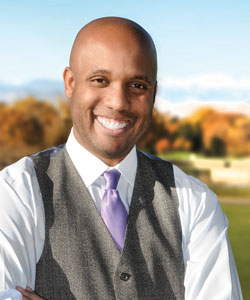President’s letter: CMS leads delegation of physicians to advocate in D.C.
by Tamaan Osbourne-Roberts, MD, President, Colorado Medical Society

It is an often-repeated cliché, particularly among those who are weary of the often-cynical approach to policy change: “money is the lifeblood of politics.”
As a former vice-chair and current ex-officio member of the COMPAC board, I won’t minimize the importance of carefully measured, ethical and principled donation to the candidates of one’s choice. However, if money is the lifeblood of our system of government, relationships are the fiercely beating heart. Or, if I may take the liberty of extending the metaphor further: monetary donations can be transfused to help keep the work of democracy flowing for a time, but if something is gravely wrong with the relationships between legislators and constituents, things will inevitably stop despite everyone’s best efforts. However, when the relationships work, if empathy and humanity beat strongly across the system, it’s remarkable what can be accomplished with even a bare minimum of monetary resources.
This point was made exceptionally clear during my February trip to Washington, D.C. for the American Medical Association’s National Advocacy Conference, a yearly event where physicians from around the country congregate to speak with their legislators. I won’t go too far into the specific events of the trip (which are covered more comprehensively in another article later in this issue), but I will say that in addition to our continued advocacy for repeal of the sustainable growth rate (SGR), one of our chief efforts this year was putting the issue of progressively narrowing insurance networks onto the agenda of the Colorado delegation as an emerging issue that affects countless physicians and patients in our state.
The response was exceptional. In a decade of visiting legislators on the Hill, I’ve never experienced such an immediate, concerned reaction to an issue voiced by our delegation. And it is my firm belief that it was not the facts of the problem that resonated with them so strongly, important as they may be; it was our stories of the patients that have been affected, including my own son, for whom we are delaying needed ear surgery because of confusion as to whether our insurance covers his doctor, his hospital, neither or both. Our positions as physicians, even my position as CMS president, carried little weight; our ability to connect legislators to the concerns of our patients, to my story as a father working hard to get needed medical care for his family, was the thing that made the difference. We were able to reach past the titles, to see each other as people, and to talk about solutions on a human level. We were able to form relationships.
Doctors have always been good at relationship building. Consequently, so have our advocacy organizations, and CMS and its component societies have spent years forming relationships with our state’s policymakers, allowing us to work collaboratively on issues ranging from telehealth to network adequacy, cost accountability and medical liability. But, as our clinical practice instructs us, relationships take effort; they require time and attention. So I encourage each of you to help your medical society in this work. Call your legislators. Send them a letter or an email. Come down to the Capitol to meet with them, or find them when they’re at home in their districts. And, yes, show up at their fundraisers, introduce yourself and donate to their campaigns if you feel moved. But above all, start a relationship. Tell them your stories – because all too often that is what makes the critical difference, for us and for our patients.
Until next time.
Posted in: Colorado Medicine | President's Letter | Initiatives | Advocacy | AMA

Comments
Please sign in to view or post comments.